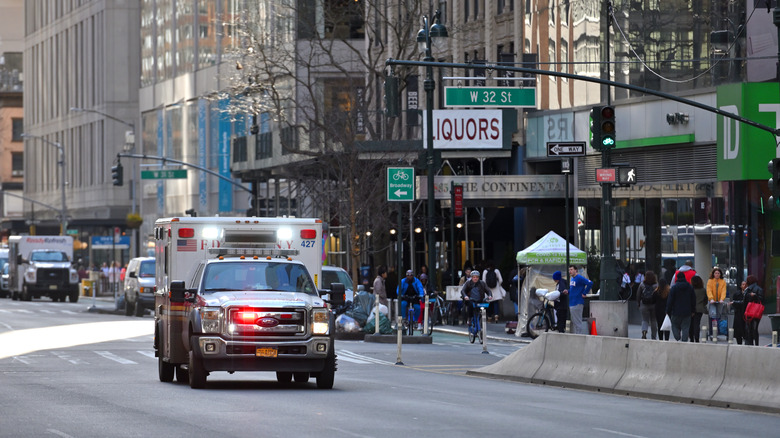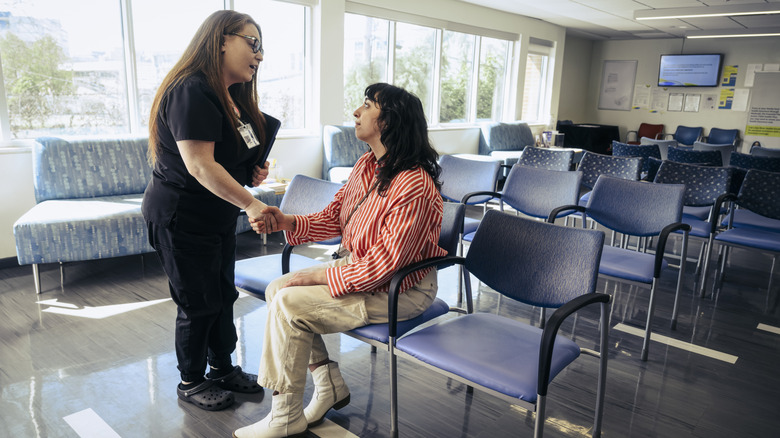What Travelers Need To Know About New York's Deadly Outbreak Of Legionnaires' Disease
Sometimes, disease outbreaks derail travel plans and present growing health risks in dream vacation destinations. If you're planning a trip to New York City, it's important to be aware of the recent outbreak of Legionnaires' disease. As of August 11, 2025, the outbreak (officially classed as a cluster by NYC Health) has killed three people and sickened 90. However, it appears to be contained within Central Harlem, only affecting five ZIP codes within the neighborhood.
The cluster appears to have originated from 11 cooling towers in the area, infecting the first person on July 25. NYC Health has already remedied the affected towers and stated that none of the city's plumbing has been impacted. This means it's safe to drink water, shower, and use air conditioning. While the cluster seems to be relatively contained, there are no guarantees right now. "Anyone in these ZIP codes with flu-like symptoms should contact a health care provider as soon as possible," said Acting Health Commissioner Dr. Michelle Morse in an official statement from NYC Health.
If you're traveling to the city, you should also keep in mind that Legionnaires' disease cannot be contracted from another person. It's usually caught by breathing in contaminated water vapor, as has been the case with the cooling towers that expel evaporated water into the air. If you catch it, you may experience symptoms like aching muscles, fever, chest pains, chills, headaches, nausea, vomiting, diarrhea, or mucus-heavy coughing. These symptoms can sometimes take up to 14 days to kick in and are usually easily treated with antibiotics. However, some people face greater risks, including death, such as smokers, those older than 50, cancer patients, and diabetics.
How to avoid Legionnaires' disease in New York
Getting sick during or after travel isn't fun for anyone. It's important to weigh up your specific risks when it comes to Legionnaires' disease. If you're someone who's at greater risk and are able to postpone your trip, you may want to avoid New York right now. While the cluster is currently only in Central Harlem, it's possible for it to spread or crop up in other cooling towers around the city. The towers are supposed to be cleaned twice a year, but inspections haven't been upheld recently due to reduced staff. This could have led to the most recent cluster, as the Legionella bacteria thrives in the warm summer months.
If you can't or don't want to postpone your trip, check if your accommodation has a cooling tower. If it does, ask if it has been inspected and cleaned recently. You should also check if the hotel has any decorative fountains, hot tubs, or humidifiers on the premises, as these can also spread the disease. To be safe, it's best to avoid Central Harlem and its immediate surrounding neighborhoods. If you've booked a hotel there and can get a refund, you may want to cancel your reservation and book elsewhere.
Legionnaires' disease has a 10% fatality rate, according to the Centers for Disease Control and Prevention. Anyone who feels flu-like symptoms should go immediately to a hospital, as early diagnosis can increase the likelihood of effective treatment. "If you're in those ZIP codes that have demonstrated exposure, then we want you to monitor your symptoms and get to a healthcare provider as soon as you can so you can get access to antibiotics, because it is treatable," Dr. Tony Eyssallenne, deputy chief medical officer for NYC Health, told NBC News 4. Staying healthy may also mean avoiding these unexpected foods while traveling.

